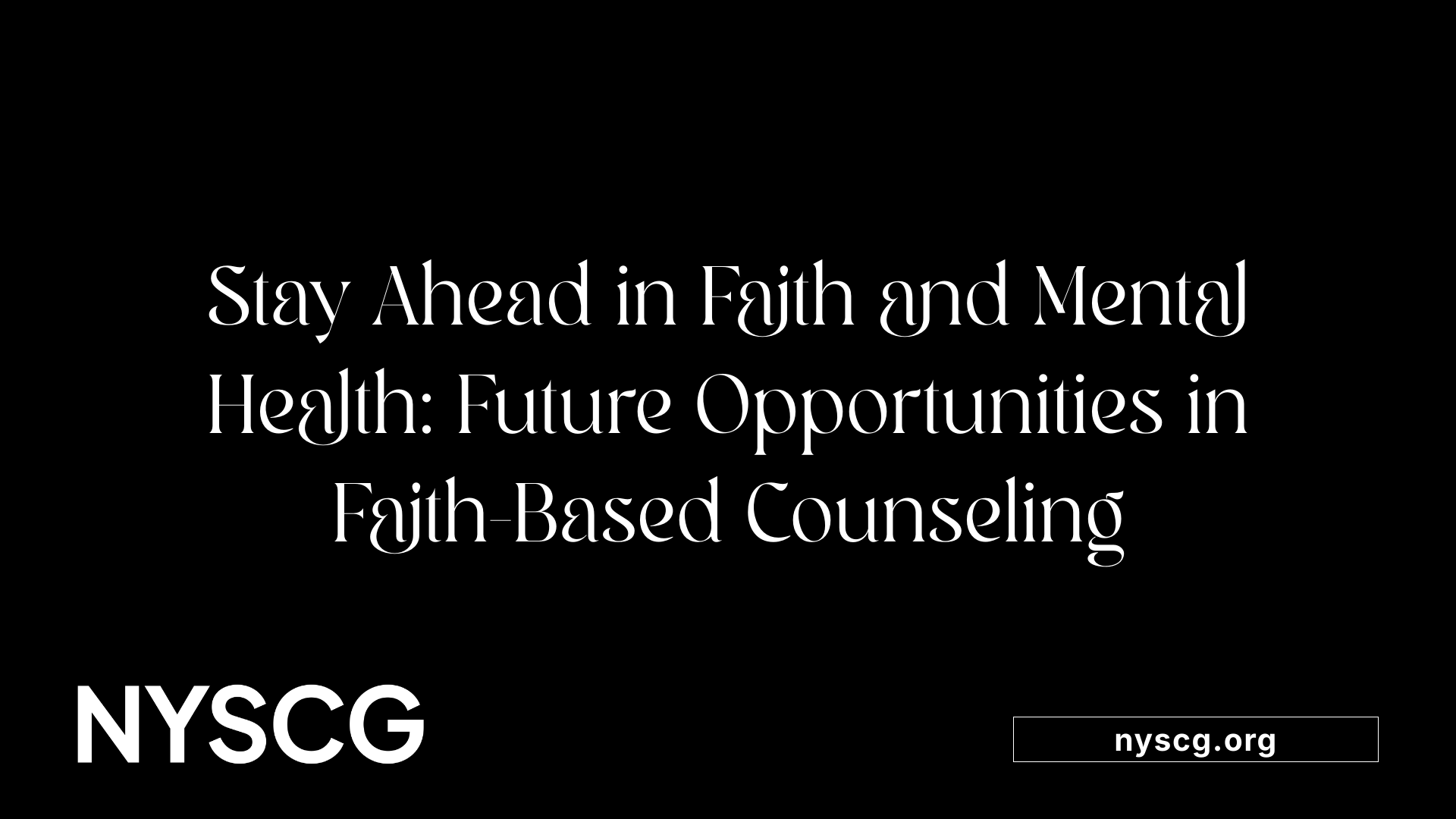Faith-Based Counseling Careers for Chaplain Graduates


Chaplain training provides a vital foundation for spiritual support within various institutional settings. As the demand for holistic mental health services grows, many chaplain graduates are exploring rewarding careers in faith-based counseling. This article highlights educational pathways, diverse roles, and key resources that can help transition from chaplaincy to specialized counseling careers rooted in faith and psychology.
 Gordon-Conwell Theological Seminary has introduced a new Doctor of Ministry (DMin) track titled 'Pastoral Counseling and Soul Care' to meet the rising need for holistic faith-based counseling. This initiative is designed for those in ministry roles such as pastors, chaplains, missionaries, and parachurch workers who wish to deepen their understanding of biblical and holistic approaches to emotional and spiritual support.
Gordon-Conwell Theological Seminary has introduced a new Doctor of Ministry (DMin) track titled 'Pastoral Counseling and Soul Care' to meet the rising need for holistic faith-based counseling. This initiative is designed for those in ministry roles such as pastors, chaplains, missionaries, and parachurch workers who wish to deepen their understanding of biblical and holistic approaches to emotional and spiritual support.
The curriculum emphasizes the development of a counseling philosophy rooted in scripture and designed to promote mental and emotional well-being. It aims to equip students with practical strategies for nurturing healthy souls within church communities and beyond, fostering resilient and well-counseled congregations.
Students in the program will participate in residencies at two key locations. The first residencies are scheduled to take place at the Charlotte campus in 2026 and 2027. The third residency will occur at the Center for Professional Development at Emerge Counseling Ministries in Akron, Ohio, in 2028. These residencies are designed to provide immersive learning experiences, practical training, and direct mentorship from experienced professionals.
The program strives to prepare individuals who offer spiritual and emotional care outside clinical settings, integrating theological depth with psychological awareness. Mentors for the track include Dr. Rodney Cooper and Dr. Robert Crosby, both noted for their extensive experience in ministry and counseling fields. Their guidance will support students in developing effective strategies for pastoral soul care.
Applications for this innovative program are due by March 1, 2026. Interested candidates should prepare their applications accordingly, as this opportunity offers a significant step toward enriching faith-based counseling skills and expanding the capacity to serve in diverse ministry contexts.

Careers in faith-based counseling often begin with obtaining a relevant educational background, such as a master’s degree in counseling, psychology, or a related field. After completing their education, professionals usually pursue supervised clinical experience and licensure, which enables them to serve as pastoral or spiritual counselors.
These counselors often find roles within churches, religious organizations, or community agencies, providing spiritual and emotional support. With experience, they can advance to senior positions such as lead counselors, directors of counseling services, or church pastors with specialized training.
An expanding option is private practice, where counselors blend clinical techniques with biblical principles. This path can offer higher earning potential and greater flexibility. Additionally, many professionals choose to specialize in areas like marriage and family therapy or substance abuse counseling, broadening their career opportunities.
The emergence of telehealth has also opened new avenues, allowing faith-based counselors to reach wider communities remotely. Overall, these pathways facilitate personal growth, ongoing professional development, and opportunities to serve diverse populations with a combination of spiritual guidance and evidence-based psychological approaches.
Chaplain training graduates have a broad spectrum of career options. They often serve as hospital, prison, or military chaplains, providing spiritual care, crisis intervention, and grief counseling in high-stress settings. These roles require additional certifications and, in many cases, a master’s degree in theology or counseling.
Another common pathway is working in churches or religious organizations as pastoral counselors, where they support congregants’ emotional and spiritual needs. They can also serve in community-based agencies or non-profit organizations, offering counseling services that integrate faith and mental health.
With further qualification, chaplains may move into private practice, providing personalized spiritual and psychological counseling. Senior roles include marriage and family therapists, youth ministers, or job counselors, often requiring advanced degrees and clinical experience.
Occupationally, these roles are available across healthcare facilities, correctional settings, and the military, reflecting a growing demand for faith-based mental health professionals. Such careers are rewarding and impactful, offering opportunities to serve in diverse environments while supporting individuals through spiritual and emotional challenges.
| Aspect | Description | Future Outlook |
|---|---|---|
| Growth in faith-based mental health services | Increasing recognition of the importance of spiritual care in mental health | Continued expansion in community and clinical settings |
| Integration efforts | Combining spirituality with evidence-based psychotherapy | More training programs and certifications to facilitate integration |
| Roles of professionals | Licensed and non-licensed professionals provide diverse services | Growing opportunities for chaplains, pastors, and counselors |
| Community demand | Rising need in diverse communities for culturally sensitive and faith-informed services | Greater diversity of services tailored to community needs |
| Education and certification | Ongoing training enhances skillsets and credibility | Development of specialized certifications and ongoing education programs |
As faith-based counseling continues to grow, innovative programs like Gordon-Conwell Theological Seminary's new Doctor of Ministry track in 'Pastoral Counseling and Soul Care' exemplify the evolving landscape. This program aims to deepen theological and psychological understanding, preparing spiritual leaders to provide comprehensive care. It will include residencies at prominent locations, such as Charlotte and Akron, with mentors like Dr. Rodney Cooper and Dr. Robert Crosby bringing rich ministry experience.
Graduates from such initiatives will be well-equipped to serve in various settings, combining theory and practice to nurture healthy, well-counseled communities. The future of faith-based counseling looks promising as it aligns spiritual wisdom with mental health advancements, widening the scope of services and making them more accessible across diverse populations.
 The Gordon-Conwell Theological Seminary has introduced an innovative Doctor of Ministry (DMin) specialization titled 'Pastoral Counseling and Soul Care.' Designed thoughtfully for individuals such as pastors, chaplains, missionaries, and parachurch workers, this program aims to cultivate a deeply rooted biblical and holistic approach to counseling.
The Gordon-Conwell Theological Seminary has introduced an innovative Doctor of Ministry (DMin) specialization titled 'Pastoral Counseling and Soul Care.' Designed thoughtfully for individuals such as pastors, chaplains, missionaries, and parachurch workers, this program aims to cultivate a deeply rooted biblical and holistic approach to counseling.
This new track emphasizes emotional and spiritual support, equipping leaders to develop strategies that foster healthy souls and nurture churches that are well-counseled and spiritually resilient. It reflects a desire to blend theological depth with psychological awareness, preparing graduates to offer meaningful care outside traditional clinical environments.
Residencies provide hands-on learning experiences and will take place at two key locations. The first residency is scheduled for 2026 and 2027 at the Charlotte campus, a hub for theological education and ministry training. In 2028, the program will transition to the Center for Professional Development at Emerge Counseling Ministries located in Akron, Ohio. This varied schedule ensures participants gain diverse perspectives and practical skills over the course of their studies.
Mentors involved in the program, Dr. Rodney Cooper and Dr. Robert Crosby, bring extensive backgrounds in ministry and counseling. Their experience provides students with invaluable insights into both theological principles and therapeutic practices, fostering an integrated approach to pastoral care.
For those interested, applications must be submitted by March 1, 2026. This deadline is essential to secure a spot in this pioneering program, which aims to prepare caregivers who operate outside clinical settings but require a solid foundation in theology and psychological understanding.
Additional resources for transitioning from chaplain training to a faith-based counseling career include joining professional associations, pursuing relevant certifications, and engaging with experienced mentors. Networks like Military OneSource offer confidential counseling tailored for military families, supporting those moving from chaplaincy into broader counseling roles. Community-based services often provide immediate, solution-focused support that can serve as foundational steps.
Ultimately, the new DMin track at Gordon-Conwell aims to produce well-equipped leaders capable of offering profound pastoral and soul care, significantly impacting faith-based counseling landscapes.
| Location | Residency Period | Focus Areas | Notable Mentors |
|---|---|---|---|
| Charlotte campus | 2026-2027 | Biblical, emotional, holistic support | Dr. Rodney Cooper, Dr. Robert Crosby |
| Emerge Counseling | 2028 | Practical counseling application | Same as above |
| Application Deadline | March 1, 2026 | N/A | N/A |
Transitioning from chaplaincy to a career in faith-based counseling offers a promising pathway for spiritual caregivers seeking to expand their impact. With specialized academic programs like Gordon-Conwell’s new Doctor of Ministry track, diverse career opportunities, and robust resources for professional growth, chaplain graduates can find fulfilling roles that integrate faith, counseling, and community service. Embracing ongoing education and networking, aspiring faith-based counselors are well-equipped to serve varied communities and address emerging mental health needs in faith-centered environments.
All you need is the will to make the world a better place.
New York State chaplain group inc. is a tax deductible organization with a federal tax Id number 92-383-4921